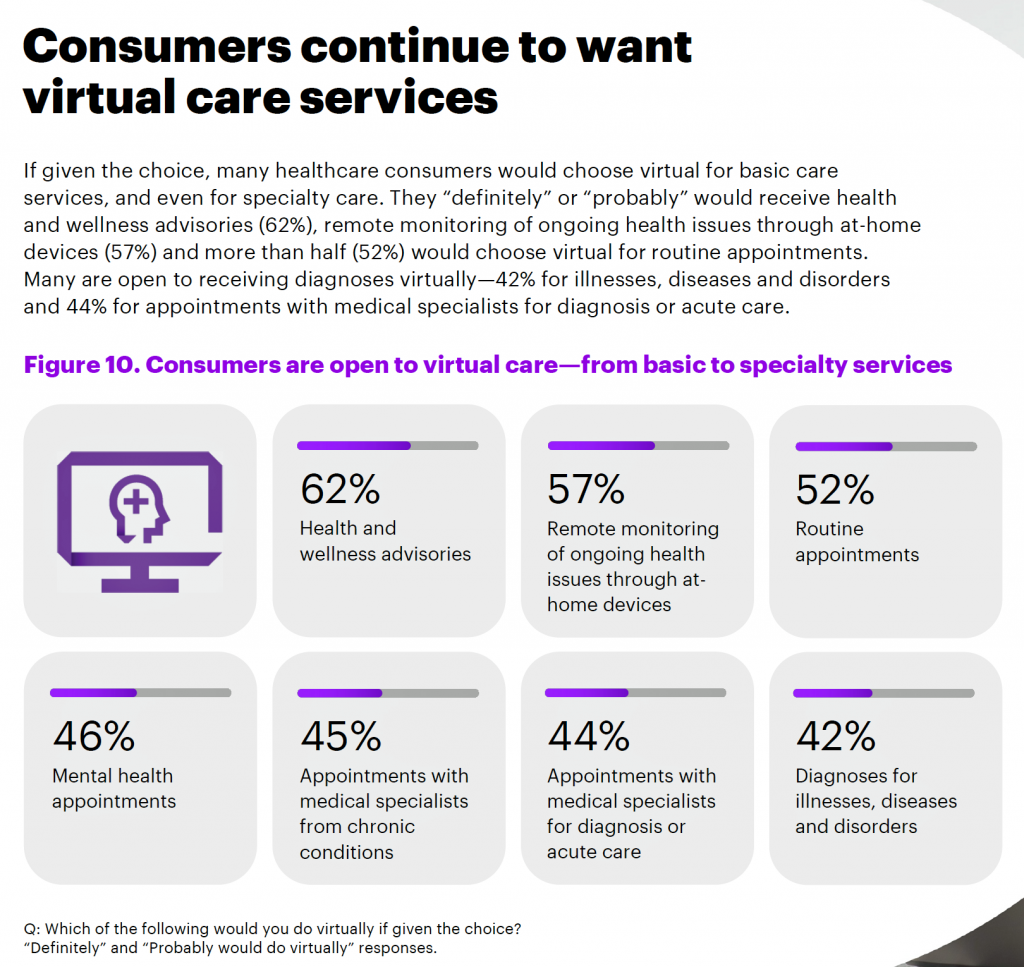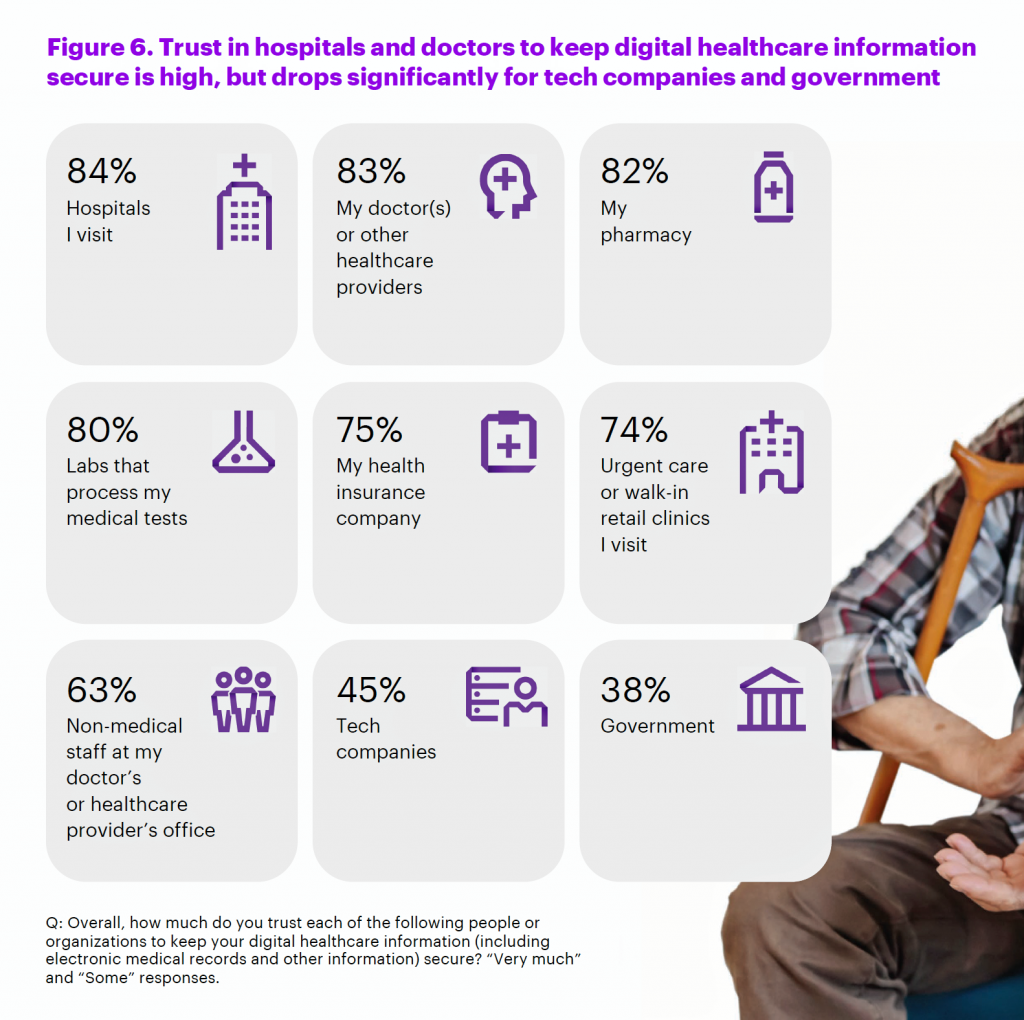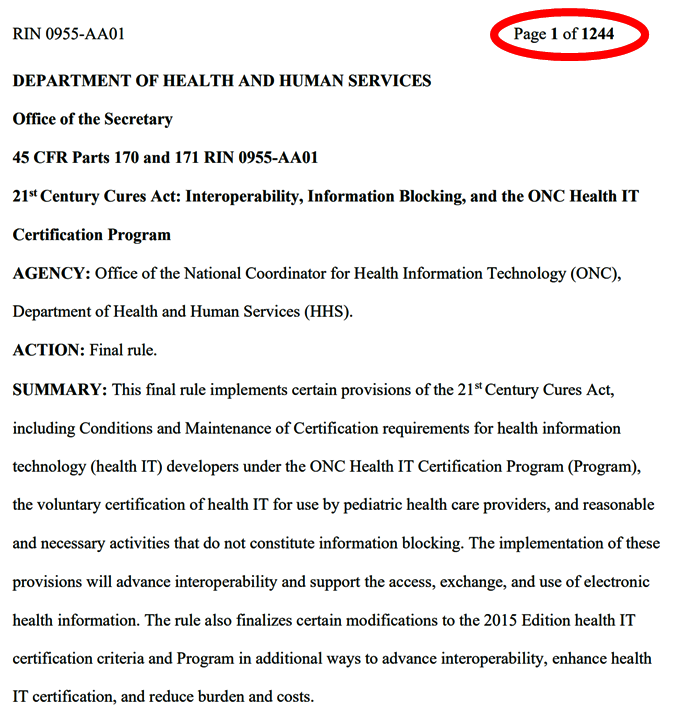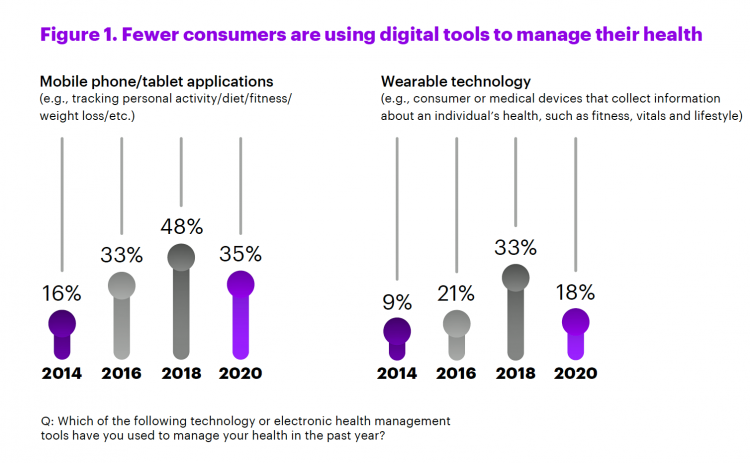 Millions of dollars and developers’ time have been invested in conceiving and making digital health tools.
Millions of dollars and developers’ time have been invested in conceiving and making digital health tools.
Yet with that bullish supply side of digital health, there was a marked decline in peoples’ use of them in the past two years, found by Accenture in their latest health consumer survey, Digital is Transforming Health, So Why is Consumer Adoption Stalling?
Use of mobile apps to track personal health activity fell from nearly 1 in 2 consumers to 1 in 3. Use of wearable tech nearly halved, from 33% to 18%, between 2018 and 2020.
Some, but not necessarily a majority, of consumers see benefits in using digital health — primary for wellness and prevention, and to get a better understanding of personal health.
As for improving health outcomes, reducing time spent with doctors, and lowering cost of care? Just 1 in 5 people see these as benefits of adopting digital health tech.
 Still, at least half of consumers want virtual care services. Six in ten people are open to health and wellness services via virtual channels, over half like the idea of remote monitoring linking with at-home devices, and 1 in 2 people would be open to routine appointments through telehealth.
Still, at least half of consumers want virtual care services. Six in ten people are open to health and wellness services via virtual channels, over half like the idea of remote monitoring linking with at-home devices, and 1 in 2 people would be open to routine appointments through telehealth.
Nearly one-half would also be keen on mental health appointments and specialty visits for chronic conditions.
People would especially welcome virtual services from traditional medical care providers, as opposed to virtual care from a technology or social media company, a retailer, or a medical startup. Only 1 in 5 people wouldn’t be willing to try out a virtual health care service.
While more younger people would be willing to try virtual care form a tech company, that would be 46% of Gen Z consumers — at the other end of the age spectrum, 30% of Silent Generation folks and 20% of Baby Boomers would be willing to try tech-company provided virtual healthcare.
 Accenture begs the question in the report’s title — “why is consumer adoption stalling?” Their research reveals that trust is a key driver of digital health engagement, and is a substantial barrier.
Accenture begs the question in the report’s title — “why is consumer adoption stalling?” Their research reveals that trust is a key driver of digital health engagement, and is a substantial barrier.
Consumers’ most trusted stewards of health care trust are health care professionals — hospitals doctors, pharmacies/pharmacists, and labs.
But even trust in the most trusted steward, my doctor, eroded between 2019 and 2020. To the issue of trusting my doctor to keep my information secure, the survey found a decline from 89% trusting my doctor in 2019 to 83% in 2020.
There’s a nuance in trust that’s a key insight in this study regarding trust in clinicians overall, and trust when clinicians use technology.
Overall, 75% of consumers trust medical doctors, and 69% trust nurse practitioners and physician assistants.
But when technology is introduced to this relationship between patients and providers, there’s a decline in trust. Specifically, 52% would trust diagnoses or treatments determined by a physician supported by an intelligent machine (IM)/AI; and, 31% would trust diagnoses or treatments determined entirely by IM/AI.
So the answer to the big question on the stalling embrace of consumers in digital tech is that privacy concerns and lack of trust hinder peoples’ use of digital solutions.
“Payers and providers need to see these findings as an opportunity to refine digital health capabilities if they want to realize the full benefit of technology investments. This is where testing and learning become a key part of adoption and ultimately the maturity of digital health,” said Kaveh Safavi, M.D., J.D., a senior managing director in Accenture’s global Health practice.
Health Populi’s Hot Points: Privacy concerns are front-of-mind among consumers in 2020 across all industries. For health care, this becomes a barrier to health engagement — which is trying to go increasingly digital, mobile and virtual. We’re less inclined to worry about Netflix outing our addiction to rom-com’s than we are a clinical lab company exposing our addiction to opioids.
But consumers clearly use digital tech in everyday life, and smartphones are truly extensions of our bodies, our selves, for better and worse. In the extensive privacy discussion in my book, HealthConsuming: From Health Consumer to Health Citizen, I cited Deloitte’s 2017 Global Mobile Consumer Survey which described consumer privacy as “a concerned embrace of technology” (see page 14 within the report link). Let’s call out the two keywords in this phrase: Concern + Embrace.
 On Monday 9th March 2020, at the start of this week, the U.S. Department of Health and Human Services unveiled the long-anticipated ONC Cures Act Final Rule for health data interoperability. That’s a wonky phrase that translates, simply put, into how our health data will be made available to us patients, consumers, health plan members, caregivers all. In the case of the Rule, the data will be provided to us via our smartphones.
On Monday 9th March 2020, at the start of this week, the U.S. Department of Health and Human Services unveiled the long-anticipated ONC Cures Act Final Rule for health data interoperability. That’s a wonky phrase that translates, simply put, into how our health data will be made available to us patients, consumers, health plan members, caregivers all. In the case of the Rule, the data will be provided to us via our smartphones.
I haven’t yet read all 1,244 pages of the Rule, but I gleaned sections on consumer privacy which underpins one of my two pillars on what’s a Health Citizen (FYI, as described in HealthConsuming, the second feature is health care as a civil right in a nation providing universal health care).
“Privacy” is mentioned over 500 times in the document; “HIPAA,” well over 300. And, there are over 500 mentions of the word, “security.”
But even with the proliferation of these words, there remain concerns about HIPAA’s ability to deal with data beyond traditional business associates — the data that come from our wearable techs, our mobile apps, our retail receipts, our daily lives that generate digital dust. I addressed this in my 2014 report, Here’s Looking at You: How Personal Information is Being Tracked and Used, sponsored by the California HealthCare Foundation. (FYI, my book, HealthConsuming, argues for a GDPR-American style to update Americans’ privacy protections).

Six years later, privacy and security concerns are mainstream among Americans in 2020. Most Americans are concerned about the privacy and security of their personal data, and 9 in ten see a lack of transparency in how companies acquire and use their data, a December 2019 study from Wunderman Thompson found. Three-fourths of U.S. consumers were also uncomfortable with the idea of machine learning. This bolsters Accenture’s finding discussed above about the use of IM/AI in health care.
For consumers to embrace their health data via smartphone or any other digital delivery channel, people will need to believe the overall experience is trustworthy, secure, and relevant to them based on their values and personal definition of health. Accenture’s research provides a very current insight into the patient’s concerned embrace of technology — especially, for health.





 I am so grateful to Tom Lawry for asking me to pen the foreword for his book, Health Care Nation,
I am so grateful to Tom Lawry for asking me to pen the foreword for his book, Health Care Nation,  I love sharing perspectives on what's shaping the future of health care, and appreciate the opportunity to be collaborating once again with Duke Corporate Education and a global client on 6th May. We'll be addressing some key pillars to consider in scenario planning such as growing consumerism in health care, technology (from AI to telehealth), climate change, and trust -- the key enabler for health engagement or dis-engagement and mis-information. I'm grateful to be affiliated with the corporate education provider
I love sharing perspectives on what's shaping the future of health care, and appreciate the opportunity to be collaborating once again with Duke Corporate Education and a global client on 6th May. We'll be addressing some key pillars to consider in scenario planning such as growing consumerism in health care, technology (from AI to telehealth), climate change, and trust -- the key enabler for health engagement or dis-engagement and mis-information. I'm grateful to be affiliated with the corporate education provider  Thank you FeedSpot for
Thank you FeedSpot for